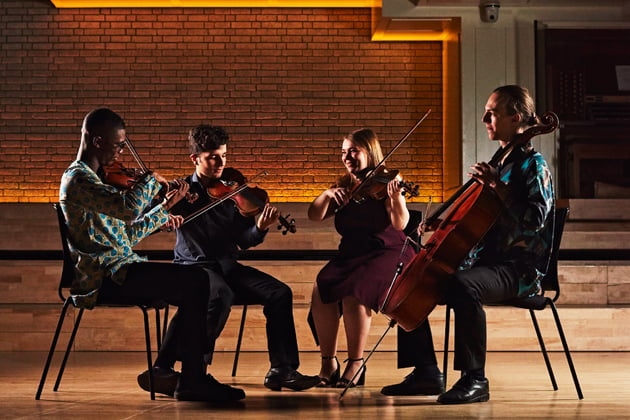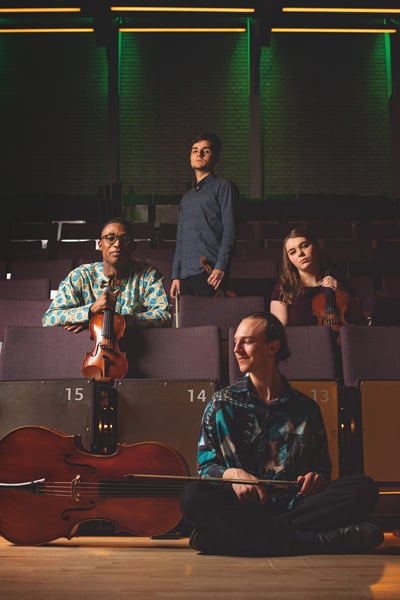Back in 2017, four students at the Royal Northern College of Music in Manchester came together to form a string quartet, which is now starting to make waves on the national scene.
Its four members come from different backgrounds and different countries – England, Wales, Brazil and Lithuania – but a strong feeling of rapport has seen the members of the Levaré Quartet develop their artistry and begin to command attention in what is one of the most demanding of all musical endeavours.
Like his three colleagues, violinist Didier Osindero is now a third-year conservatoire student. He grew up in Hertfordshire, although his parents are from Nigeria. “They’re not musical, but my sister began playing the piano when she was six. I wanted to learn an instrument too, so a year later, when I was four, I started on the violin.’’
After that he had regular weekly violin lessons and eventually got involved with the musical community in Hertfordshire. ‘‘I began at the Junior Guildhall when I was nine years old, then I went on to the Purcell School of Music, and finally I moved to Manchester to study at the RNCM.’’
An international string quartet
His fellow violinist Mateus Dandalo comes from Brazil. ‘‘My dad is a non-professional musician. He had a rock ’n’ roll band when he was younger and always encouraged me to learn an instrument. I began lessons when I was 10 because my parents had heard of a local music school run as a social project for the community.’’ Also a musician, Mateus’s brother had already come to the UK to study. Mateus joined him when he was 18 years old.
The quartet’s viola player is Emily Davies, originally from Aberystwyth, but brought up in Welshpool. She began violin lessons when she was seven but switched to the viola four years ago. Like most of the others, she doesn’t come from a particularly musical family.

Finally, the group’s cellist is Julius Jonusas, who hails from the Lithuanian capital, Vilnius. He began to study his chosen instrument at the local arts school at the age of six. “Then when I was 15, I moved to Manchester to study at Chetham’s School of Music. After that I went on to the RNCM, and there I met the other players.’’
Freedom and diversity: why Manchester excels for music
Manchester has achieved worldwide fame as a musical centre in many different genres, and can boast three major orchestras – the Hallé, the BBC Philharmonic, and the Manchester Camerata – while the city has been home to a conservatoire since 1893.
In fact, all of the UK’s major conservatoires – in London, Manchester, Glasgow, Cardiff, Birmingham and so on – have international reputations, drawing students from all over the globe. Was there any particular reason why these four musicians chose the Royal Northern College of Music?
For Emily, ‘‘it was all the opportunities that are here in Manchester – it’s such a big city.’’ Didier sensed that in terms of the music schools he visited, “the atmosphere seemed the most friendly, while the teaching has been really good – I think all of us study with excellent teachers. It is also a place where you can go down a variety of artistic routes, allowing you to explore different options and different styles of music. You get to do a lot of projects with amazing musicians coming in from all genres of music. That was a big selling-point for us.’’
In Mateus’ case, ‘‘My brother had told me how many internationals were studying at the RNCM, from more than 60 countries, and how welcome they were’’.
Julius also believes that Manchester in particular and the north-west in general is a growing community with a rising professional standard of music. ‘‘It’s a perfect time to be a part of that. Some of the colleges in London, Berlin or America, for instance, are perhaps more traditional in their approach. Maybe there is more freedom and diversity here.’’
From first concert to prestigious prize
Following their first rehearsals the string quartet gave their first informal concert in December 2017. Their first official concert took place at the college’s annual and intensive Chamber Music Festival four months later, and they went on to win the prestigious Weil Prize for chamber music performance.
At this early stage the group still had no name, but it soon became necessary to find one so they had a meeting to come up with some ideas and to see what worked. ‘‘I thought of Levaré,’’ explains Mateus, ‘‘which means upbeat in Italian’’.

In terms of repertoire, is the Levaré Quartet currently specialising in any particular area? ‘‘Not at the moment,’’ says Didier. ‘‘We try to play as much as we can, ranging from Haydn to Bartók and Webern. At the moment we’re working on a Schoenberg string quartet, but we also did a jazz performance with Gwilym Simcock a couple of months ago, and we’ve performed our own arrangements of folk music. If a promoter requests a particular piece, or extends an opportunity to try something different, we’re keen to do that’’.
How does Julius see things going forwards? ‘‘At this stage, whenever we are offered a performance, we dive into different genres of music, so we are exploring a wide range of repertoire that we are interested in.’’
Music education at the RNCM
Their studies, of course, continue. Julius says the quartet is still learning from “great tutors, such as Donald Grant” – a former RNCM student violinist and now a member of the well-established Elias Quartet, formed at the RNCM back in 1998, and a member of the BBC Radio 3 New Generation Artists scheme. The Elias Quartet’s recordings on the Wigmore Hall Live label including a complete cycle of the Beethoven quartets. ‘‘Czech chamber music player Petr Prause, a former member of the Talich Quartet, has also been a great inspiration to us,’’ confirms Julius.
‘‘When you get a piece together you can take it to the tutor,’’ says Emily, ‘‘and they show you some of their ideas and help you shape it; but then you can go to another teacher, and they might say completely different things. At the end of the day, as they say, it’s what you feel, it’s your interpretation – so you can play it as you like, how you feel it. That’s very inspiring.’’
Live performance highlights
As part of their development and training, the ensemble have been coached, as Emily recalls, by several distinguished chamber groups, including not only the Talich and the Elias but also the Michelangelo Quartet, the Sitkovetsky Trio and Trio Gaspard.
For Emily, one highlight for the string quartet was providing music for the Player of the Year award at Old Trafford, home to Manchester United. ‘‘That was pretty cool.’’ But she also singles out a recital at Wigton in Cumbria in October 2019 ‘’because it gave us a chance to choose our own repertoire, which is a really good thing to do.’’ They picked Haydn, Beethoven, Bartók and Webern.
Other memorable appearances have included the Malvern and Solway Arts festivals and, in and around the city itself, at the Midland Hotel, Gorton Monastery and Manchester Cathedral.
Protecting musicians post-Brexit
Thus far the quartet’s dates have all been in the UK, but this will surely change, and inevitably like many musicians the Levaré are worried about the impact of Brexit on such crucial matters as foreign bookings, visas and travel ‘‘That’s definitely one of our big concerns,’’ Emily confirms.
One of the intriguing characteristics of the group is its blend of nationalities. Does that bring something special to their music-making, or to their discussions, or even to their way of relating to one another?
How diversity enriches music repertoire
Didier believes that with colleagues from different cultures and different backgrounds, no two people will come up with the same ideas, even within rehearsals. ‘‘It does make for an interesting blend.
It also allows for spontaneity. For example, when we did the folk-tune arrangements, we selected folk-tunes from each of the countries we represent. We decided to try to make each of the arrangements as traditional to the culture from which they came as possible, using rhythms from Brazil, Lithuania, and so on.’’
The benefits of MU student membership
As young musicians, the Levaré Quartet are naturally interested in the support and benefits offered by the MU and recently took out student memberships.
While none of the four knows what the future has in store for them, they are all hoping that they will have a future as the Levaré Quartet. As Mateus notes, ‘‘I obviously do solo stuff in my individual lessons, but I want to concentrate more on chamber music and to have this group, and maybe orchestral playing as well’’.
Like the other members of the string quartet, Julius hopes that the group can stay together after they graduate. ‘‘Perhaps with the help of our tutors and their connections, we can establish a residency somewhere,” he says.
“As long as we are able to live comfortably and afford our lifestyles, all of us would ideally prefer to pursue the quartet career, because it’s a pleasure to work as a group and we get along well. You never know what career choices we might have to make, but at the moment our goal is to focus on that.’’
For more information on the Levaré Quartet please visit their Instagram profile. You can watch recordings of the Levaré Quartet’s performances on their YouTube channel